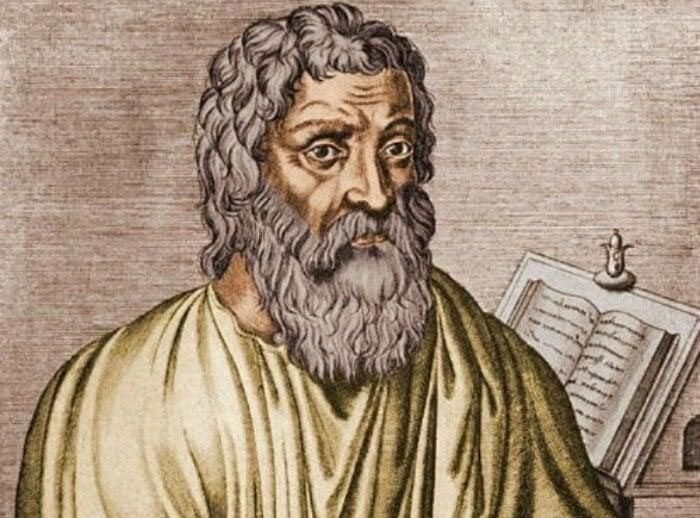He is considered the first doctor of modern medicine, and his career has left a significant legacy for the world of medicine. So, who is he?
Questions
1. Who is the founder of Western medicine?
A: Archibald McIndoe
B: Florence Nightingale
C: Hippocrates
D: Marie Curie
2. What crime was Hippocrates imprisoned for?
A: Spreading religion
B: Outdated medical views
C: Creating life-saving medicines
D: Opposing religious views

Hippocrates – The founder of medicine.
3. What legacy did he leave for the world of medicine?
A: The Hippocratic Oath
B: The Hippocratic Corpus medical toolkit
C: The book “The Complex Body”
D: All of the above
4. In the oath, to whom did Hippocrates first swear?
A: Apollo
B: Asclepius
C: Hygieia
D: Panacea
5. Where did Hippocrates die and get buried?
A: Thessaly
B: Kos
C: Thrace
D: Macedonia
Answers
Question 1: Answer C – Hippocrates. Hippocrates is the founder of Western medicine, known for creating the Hippocratic Oath that medical students must recite upon graduation. According to Biography, Dr. Hippocrates was born on the island of Aegean, Greece, around the mid-5th century BC. He is regarded as the first doctor of modern medicine. During this era, medicine was still closely tied to religion and illness was treated through mystical supernatural phenomena. However, Hippocrates rejected these beliefs and became the first to view medicine as a science. He believed that every illness has its own cause. The collection of works presented by Hippocrates represents a rudimentary understanding of how the body functions and the nature of disease.
Question 2: Answer D – Opposing religious views. Although he lived over 2,000 years ago, Hippocrates’ medical views are remarkably modern. He believed that the body should be viewed as a whole rather than a collection of separate parts. He accurately described many symptoms of diseases and was the first physician to describe symptoms of pneumonia and epilepsy in children. He trusted in the body’s natural healing process through rest, proper nutrition, and living in a clean environment with fresh air. Hippocrates noticed that different individuals exhibit varying degrees of illness and have different abilities to withstand disease. He is believed to be the first physician to assert that thoughts, emotions, and feelings originate from the brain rather than the heart.
Before Christ, people did not understand the workings of the human body, and performing dissections on corpses for research was strictly forbidden. Due to his ahead-of-his-time views and opposition to religious beliefs regarding illness, Hippocrates was sentenced to 20 years in prison.
Question 3: Answer D – All of the above. According to the University of Hanoi’s Faculty of Medicine, his legacy includes the Hippocratic Oath, which stems from the ethics and standards he established. To this day, the medical field regards this oath as a moral guide for physicians. Many principles in his writings remain valid today. Additionally, he left behind the Hippocratic Corpus, a medical toolkit comprising 70 texts detailing the symptoms and treatment methods for various diseases. This collection was compiled 100 years after his death. Historians believe these documents were beneficial for physicians in their practice throughout subsequent generations. At the time of his conviction for opposing religious views, he authored the book “The Complex Body”, many details of which still hold true today.
Question 4: Answer A – Apollo. In Greek mythology, Apollo is the god of light, truth, and the arts, often depicted as a young man with golden hair, wielding a silver bow and playing the lyre. In the Hippocratic Oath, he first swears to Apollo.
The original text of the Hippocratic Oath:
“I swear by Apollo, the healer, Asclepius, Hygieia, and Panacea, and I call to witness all the gods and goddesses, that I will keep this Oath and this stipulation, according to my ability and judgment:
I will respect my teachers in this art as my parents; I will live in a state of cordial friendship with them and, if necessary, share my goods with them; I will care for their children as if they were my own siblings, and I will teach them this art.
I will prescribe for the benefit of my patients, according to my ability and judgment, and I will never do harm to anyone.
I will not give a lethal drug to anyone if asked, nor will I suggest such a plan. I will not give a woman an abortive remedy.
But I will maintain purity in my life and in my practice.
I will not perform surgery for stone, even on patients who are afflicted with this ailment. I will leave such procedures to those who are specialists in this field.
In every house I enter, I will do so for the benefit of my patients, keeping myself free from all intentional wrongdoing and from all seduction, especially from the pleasures of love with women or men, whether they are free or slaves.
All that I may see or hear in the course of my profession or in daily commerce with men, which ought not to be spread abroad, I will keep secret and will never reveal.
If I keep this Oath faithfully, may I enjoy life and practice my art, respected by all men for all time. If I transgress and violate this Oath, may the opposite be my lot.”
Question 5: Answer A – Thessaly. Hippocrates died and was buried in Larissa, Thessaly. He died in the same year as Democritus, which means—depending on the source—he passed away at the age of 90, or possibly 104, or even 109. His two sons, both trained by him as physicians, continued the family tradition. After his death, a cult was established on his home island of Kos. Hippocrates was revered as a divine figure, with ceremonies held on his birthday.


















































